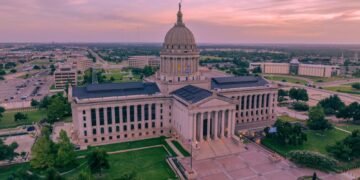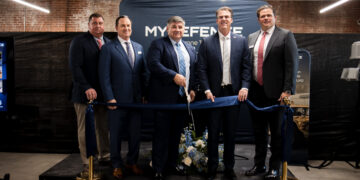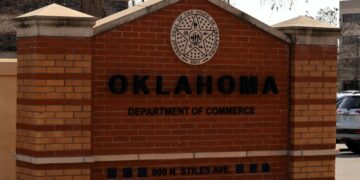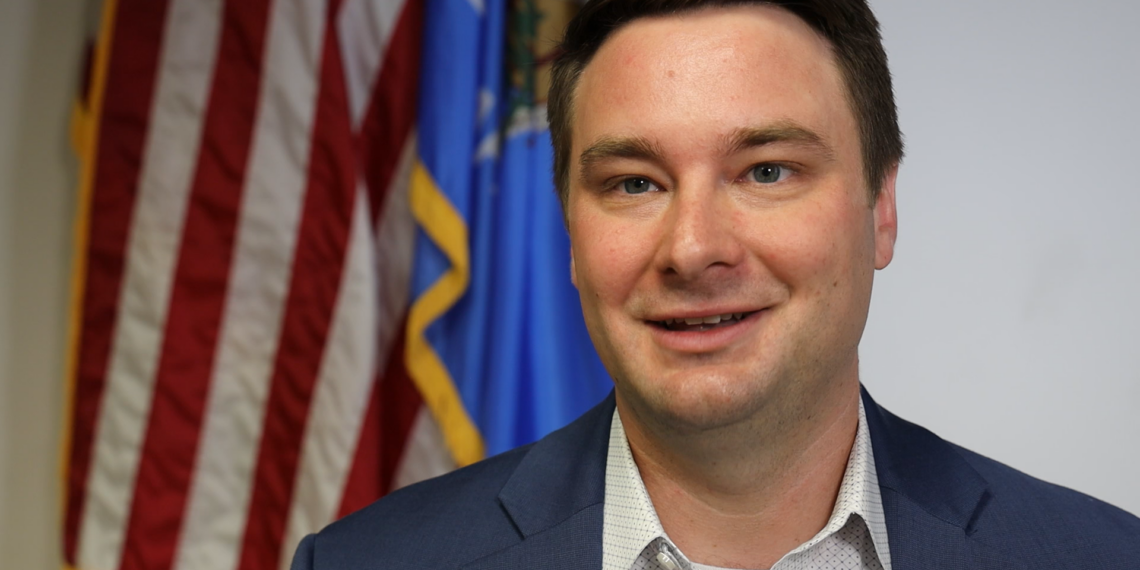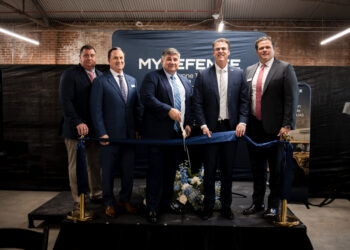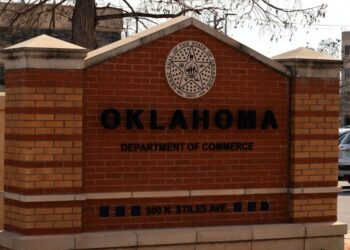OKLAHOMA CITY (OBV) – Rep. Kyle Hilbert will become the youngest House speaker in Oklahoma history in January. He sat down with Oklahoma Business Voice to discuss a range of important issues, including tax reform, economic and workforce development and Oklahoma State University’s chances to win a conference championship.
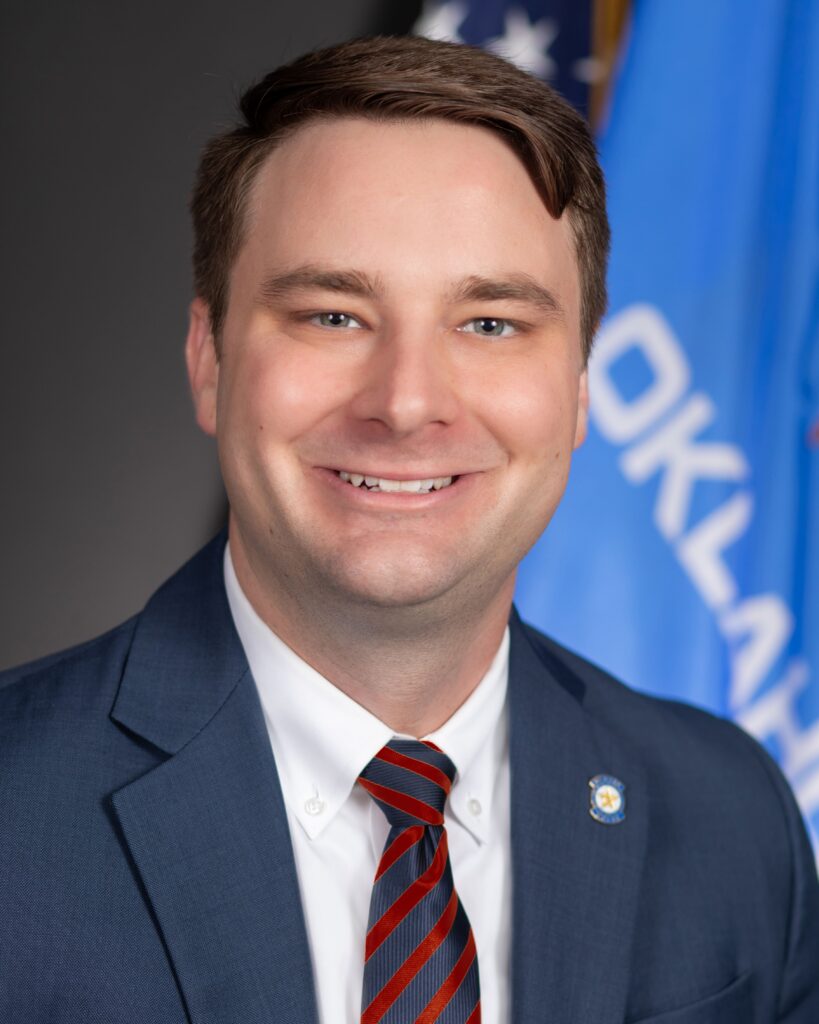
Rep. Charles McCall, current speaker of the Oklahoma House of Representatives, announced in March that Hilbert, R-Bristow, will succeed him in the position. McCall, R-Atoka, was in his eighth and final year as House speaker and 12th and final year in the House of Representatives.
The House Republican Caucus elected Hilbert speaker-designate for the 60th Legislature.
“Kyle Hilbert, in my opinion, is going to be a great speaker of the House of Representatives. Kyle has worked through the absolute worst times in state history, as I have, and emerging to the best times in state history that we see today. I’m very confident that Kyle Hilbert will continue to lead the House of Representatives to better and greater things than I have been experiencing myself, my journey of the last 12 years. The House of Representatives will be in very capable hands, very experienced hands,” McCall said in March. “I’m not only excited for Rep. Kyle Hilbert, I’m excited for myself [and] the House of Representatives.”
Hilbert is 30 years old. He will be the youngest speaker in the state’s history when he officially assumes the office in November. As speaker, he will serve as the House’s chief presiding officer and be responsible for committee appointments, the flow of legislation and the management of the House budget and staff. He will also be an ex officio voting member on all House committees.
An OSU graduate, Hilbert has held numerous positions in the House, including vice chair of the Appropriations Committee. He served his third year as speaker pro tem of the House of Representatives during this recent legislative session.
We interviewed Hilbert about his responsibilities as House speaker, his previous accomplishments in the legislature and what needs to be done to bolster economic development, grow the state’s workforce and attract the best companies and talent to Oklahoma.
What were your initial thoughts when you first won the election and became speaker – the youngest speaker ever in state history?
Hilbert: When my colleagues elected me to be speaker-designate and succeed Charles McCall as the next speaker back in March of this year, it was very humbling to really think about the history of it all. When I swear in in January, I’ll be the 45th speaker of the Oklahoma House of Representatives, and there’s a lot of history that comes with that in the past, but there’s a lot of weight as well in the present.
And every day with, the passing of time, the weight of the office, of serving as speaker of the House, becomes more and more apparent, because, of course, I will still have the duty of representing my House district and House District 29 and those constituents, but also the added weight of representing all of the members of Oklahoma House and, frankly, all four-million Oklahomans in this role in the legislature, tasked with creating the laws of the great state of Oklahoma.
And, for me, coming to the State Capitol, coming from Bristow when I drive down the Turner Turnpike and exit and come down Lincoln, I have that beautiful view. I think it’s one of the most pretty views in the state – coming south on Lincoln Boulevard, driving down to Oklahoma. You see the dome with the Guardian on top, and that’s something I never take for granted – the awe of this job and just how important it is.
There’s only 149 people who are legislators, who are elected by our neighbors, our family, our friends and our House districts to to make the laws of the state of Oklahoma. It’s an incredibly important task. And I’m just humbled to be selected by by my peers to lead them for the next two years.
When you were a young high school student, what got you interested in politics? Did you see yourself in this position this quickly someday?
Hilbert: I grew up in Depew. I’m a Depew Hornet. I graduated with 33 people in my graduating class. Eight-man football, I was on the team. I shouldn’t say that I played eight-man football because I was the waterboy; maybe if we had 11, I would have got a little more playing time. But yeah, small town Oklahoma.
I think a lot of times, people think you got to come from a big city or a well-connected family to make a difference. But here I am, coming from Depew, Okla., 33 people in my graduating class, less than 500 people in my hometown. And I was able to speak at commencement at Oklahoma State University, serving as student body president, and now here I am about to take over as the 45th speaker of the House. Just because you’re from a small town, doesn’t mean you can’t do big things. It’s really a testament to the people that invested in me and my mentors, me being able to make a difference.
You asked me if I thought one day I would be doing this: no. It’s funny, I have some friends that really believed in me and probably saw me doing something like this well before I did, but God opened doors. And for me, it was a decision: do I step through the door and take the risk or do I not?
My wife, Alexis, has been incredibly supportive every step of the way, and I wouldn’t be here without her. She’s the one that holds down the home front with our girls, and is the person who proofreads my speeches and makes sure that all my Facebook posts don’t have typos in them. Her support makes all this possible.
What are some of the key initiatives that you’re most proud of since becoming a legislator?
Hilbert: I’ve served eight years now in the Oklahoma Legislature. My first two years as a freshman, and then three years as vice chair of appropriations, and in the three years since then, I’ve served as our speaker pro tem. So, six years in a House leadership role, and most of my focus has been on the budget.
And so a lot of the my proudest achievements, I can’t take the sole credit for; it was a team effort from Republicans in the House and the Senate and the governor. But we have a strong savings account. When Gov. Stitt was first elected, the goal was $2 billion in savings. We’re looking at nearly $5 billion in liquid savings right now for the state of Oklahoma, which is absolutely incredible.
It’s something that we all do in our personal savings accounts. Not that we all have $5 billion, but we all in our personal life make sure we have money set aside for the inevitable rainy day, especially in the light of chaos of national and global politics right now. The rainy day is going to come, and we’re going to need those resources.
And so, the fiscal stewardship that we have in the budget cannot be overstated. For me personally, I’ve done a lot of work on the workforce as well. [I’ve made] some initiatives in the education world, like reducing ghost students. A report came out recently from the Reason Foundation showing where our changes to the school funding formula – that Sen. Zack Taylor and I ran and The State Chamber supported back in 2021 – to reduce ghost students, has put $180 million back into the funding formula for per pupil funding, funding students that actually exist instead of funding ghost students. That’s a huge win. The Redbud funding formula was something that I was proud to champion, which makes sure that students and all public schools are funded in a more equitable fashion. That’s rural schools, that’s charter schools, that’s school districts with a strong military presence that otherwise were really disadvantaged when it came to how the school funding formula works.
And so, those were some of the initiatives that I worked on, and it’s been a lot of fun. Most of my time in the legislature, it’s been about solving big problems. We have term limits in the state of Oklahoma of 12 years, which a lot of people have a lot opinions about that. But what I will say for me personally is I view it as kind of sand in an hourglass that is always going out. And so I now have more sand in the bottom of my hourglass than I have at the top of it. And so for me, it’s always go, go, go. Let’s find ways to get solutions. We have these big problems. We have a limited amount of time. Let’s go make a difference.
And some of these changes, you’re not going to see a difference the next year. I talked about the ghost student issue; it took three years before we saw a difference from that, and that’s just because that’s how long it takes for the data to come out. And so for me and the legislature, for my colleagues, a lot of the things we’ve been focusing on are not election-cycle-to-election-cycle changes, but changes for generations.
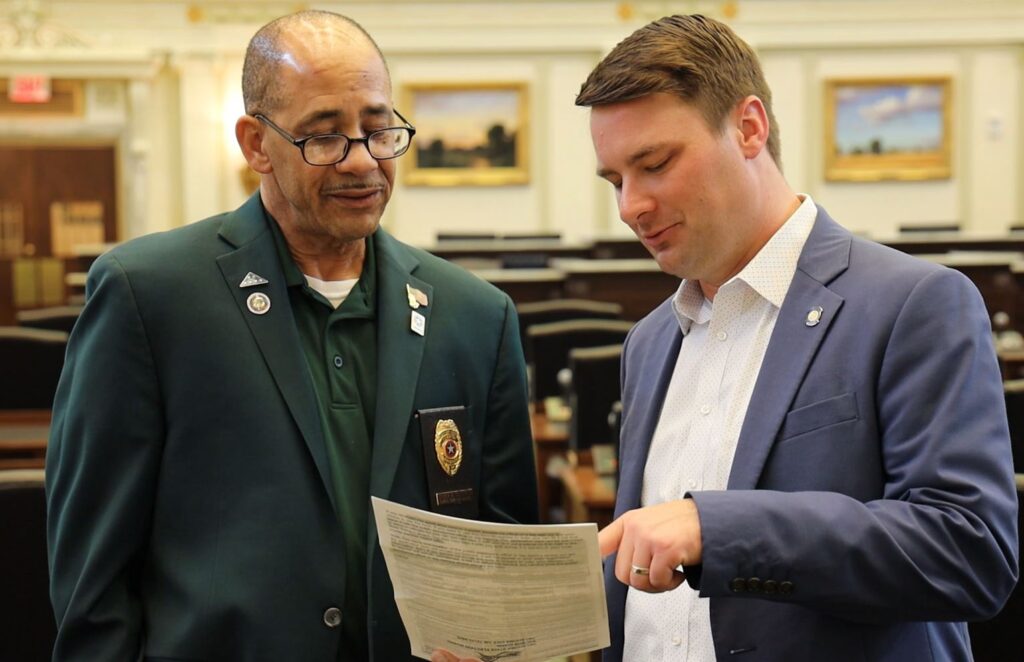
Your background – an agribusiness degree from OSU – speaks to two things that are very close to The State Chambers heart, too, the business community and the agriculture community. Agriculture is a huge business for Oklahoma. How important are those to the state of Oklahoma and to the well-being of its economy?
Hilbert: I’d say the agriculture sector is really the backbone of Oklahoma. Of course, now you have, the energy industry and the aerospace sector surpassing agriculture in terms of the economic value. But when you look at it beyond that, you you have to eat to survive. And so, agriculture is at the forefront of everything that we do.
It’s funny, we were in a budget hearing this spring, and we were advocating in the House for some funding for the Food and Agricultural Products Center at Oklahoma State University. And one of my colleagues said, “We got to fight for this. We got to get this funding for rural Oklahoma.” And I kindly corrected him to point out, “Yes, this is for rural Oklahoma, but this is also for suburban and urban Oklahoma, because if you eat, you’re involved in agriculture.” And it not only is important to our economy, it’s also an issue of national defense. We as a nation have to be able to self-sustain our own food products. If we don’t, who are we as a nation? If and when global conflict ever occurs and we’re in a war and we don’t have access to our own food supply chain, we’re done, the war is over.
The agriculture sector is incredibly important to our state, and especially how that interplays not only with our large producers. We have big pork producers like Seaboard out in Guymon, but we also have your small mom and pop cow calf operations with 10 head of cattle. All those matter and they make a difference.
It’s incredibly important as each generation comes further and further removed from the family farm, that we remind people where their food comes from because a lot of people don’t know. That misinformation, can really cause problems for our nation and for our state. And so, it’s important to continue to support our agriculture industry.
Your predecessor is from the banking industry and was very focused on taxes and tax reform. How important will tax reform be for you in the coming years?
Hilbert: I think we’ve got to continue to talk about it. We we do have some challenges when it comes to tax reform in the state of Oklahoma. And a lot of people talk about State Question 640 and the requirement to have three-fourths to raise revenue. But we also have a single subject clause in our constitution. So what that means is when you talk about reform, sometimes it’s challenging because when people want to pursue reform, they oftentimes want to raise in some areas and lower and others. And that gets challenging when you have to have those as separate bills and single subject.
I think we have to continue to look at the tax code, but do it in a way that makes sense for consumers. What we’ve been pushing for in the House is to continue to decrease the income tax rate because that’s really a benefit to Oklahomans. Because at the end of the day, some of the other taxes that people pay passing through, those are not Oklahomans. So, if they want to pay more taxes then let them pay it. But let’s keep taxes low on Oklahomans.
We’re one of the lowest tax states when you look at it holistically at what people contribute to government. And let’s continue to keep it that way to make a business-friendly environment. And we see company after company moving to the state of Oklahoma, particularly away from California and other liberal states because they want places that not only are friendly to business but just want to be left alone. And what we want to do in Oklahoma is be a business-friendly environment.
Because of tax changes in the way corporate structures have shaken out in the last probably 10 years, the personal income tax is more important to business than it used to be as well because of the way that the LLCs and everything else are structured. So, there is an actual economic development component to the income tax as well, right?
Hilbert: Absolutely. The income tax is important and we’ve made great strides. I often hear pushback because in the House we pass multiple versions of an income tax cut and some say, ‘Well, a quarter percent, nobody will notice that. No one will notice a quarter percent.’ Well, what I like to argue is what about the 7 percent? That’s what it was when Republicans took the House, when Speaker Todd Hyatt became speaker back in 2005. So, don’t talk about a quarter percent. Talk about the progress that Republicans have made over the past 20 years, because I guarantee you that 2.2 for 5 percent is certainly noticed by taxpayers if they had to pay it.
Republicans have done a great job in reducing income tax and the burdens on Oklahomans. Rome wasn’t built in a day, so it’s not something where you just wave a magic wand and have 0 percent income tax. But we’ve made great progress, and I believe it’s making a huge difference for everyday Oklahomans as well as for business owners that want to move and expand in the state of Oklahoma.
As a politician, it’s probably pretty evident to you that a healthy business community provides for a healthy economy and a healthy state. How important is that to you when making decisions on legislation?
Hilbert: It’s essential. Sometimes the national media like to attack corporations. But you know, I was walking into The State Chamber and I noticed that Dana Weber is the chair right now for the Chamber. And I had the pleasure of speaking at a ribbon cutting ceremony just last month for Miss Weber and Webco in Sand Springs.
Webco is a corporation, but it’s also a family. They care about their employees like no one I’ve ever seen. And it really means something to them in terms of the quality of life, not only for their employees, but for their family, for the communities that they’re in.
You see companies like Webco, you see leaders like Miss Weber, and you just know what it’s about is making sure we’re promoting businesses so that they can thrive, because when Webco thrives, Sand Springs thrives, Manford thrives, Kellyville thrives, Tulsa thrives, because they are supporting the local community.
As a legislator, when I’m supporting business, I’m not just supporting business, I’m supporting my constituents, I’m supporting those people. In Sand Springs, they may not all work for Webco; maybe they work at the local grocery store. The local grocery store has more sales because of the employees of Webco. And it’s a reverberating effect throughout the community that when you support businesses that are successful, it’s good for the state, it’s good for the economy, it’s good for everybody.
What are your top priorities as House speaker?
Hilbert: It’s interesting because in this role as speaker, of course, there’s things that I personally care about as a legislator, but I’m in a new role where I’m here to champion for the caucus. And so what we will do is we’ll have a caucus retreat after the election cycle wraps up in November and before the session begins in February.
But we will really dive in and figure out what are some of our priorities, things that we want to address moving into the next session. Some of it, I think, will be continuing conversations of what we’ve done in the past. CPAC (Conservative Political Action Conference) has rated the Oklahoma Legislature as one of the most Conservative legislatures in the country. I think you’re going to continue to see that we want to continue to be that way and have a Conservative governance that lets personal liberty thrive and lets business thrive.
Mental health is something we’ve talked a lot about. That was a problem prior to the pandemic. It’s only been exacerbated by COVID. And so we’ve got to continue to address that.
When it comes to education, early childhood in particular is something we’ve talked a lot about. We’ve made a lot of investment in reading in particular, because what you notice is that if a child’s behind in the second grade, they’re far, far more likely to be behind in the sixth grade, in 10th grade and never catching up. And we need more STEM degrees. We need more engineers. We need more scientists. We need more physicians. But you’re not going to be a physician if you don’t learn how to read. And so we made some targeted investments in reading. And I think you’re going to see us continue to to talk about that in the legislature, as well as infrastructure.
Something in the House we’ve championed is the Prep funds and Prep 2.0. And we want to continue to do that to make sure when businesses want to come to our state, that we have shovel-ready projects, that your economic development area has the big five, that it’s got fresh water, wastewater access, gas, electric, paved road, broadband. It’s got all of that in an accessible region so that when a company wants to move, if they’re looking at Oklahoma, they can say, “Well, if we come to Oklahoma, they’re going to be able to turn dirt tomorrow. Whereas if we go to a Kansas site, we’re going to have to wait six months.” That six months could be the difference in Oklahoma getting a business versus it going to a neighboring state. And so that’s something we’re going to continue to prioritize in the House.
Workforce development and economic development go hand in hand. How important is it? How important is it for the legislature to be leading the charge to make sure that the state has all doors open and all possibilities of recruiting new businesses, growing existing businesses, and getting those businesses the workforce they need to thrive?
Hilbert: Absolutely. The worst thing you want to do is recruit a business to come here, and then they can’t recruit the workforce [they need] and they can’t succeed. So, they absolutely go hand in hand. And I appreciate the Chamber’s focus on education in recent years because it matters. And what that means is we need to be educating students K-12 so that they’re ready for the workforce or college or post-secondary. They need to be ready for something once they graduate high school.
And the importance after that in the post-secondary degrees and CareerTech and higher education, is that we’re educating students for degrees that they can actually use. It does no good for the student to educate them in a gender studies degree that they can’t actually go get a job with. The only job that’s available is to go back and teach for that degree field. We need to prepare for degrees that are usable in the workforce. Because that’s what’s best for the student. And I think that’s what we’ve been laser-focused on as a legislature is students. What can we do to achieve better student outcomes? And if you’re focused on student outcomes, you’re going to have better workforce. You’re going to have better economic development. It all ties together, but it’s got to be student driven.
It is important for Oklahoma to have a better economic development plan?
Hilbert: Absolutely. And and continuing to focus on those [economic development] projects. We’ve really rethought the way we do those economic incentive packages. Look, I think if you talk to most legislators, they would agree: we wish we didn’t have to do economic incentive packages. You wish every state would just let the free market reign. But at the end of the day, other states are competing.
We got to compete too. And we’ve we’ve got to come up with good economic development packages. But we also have to be good stewards of taxpayer dollars and what you’ve seen from the legislature. There’s been some talk about times where we’ve set up funds and maybe we didn’t land the big company that people were talking about.
But what you didn’t hear people talking about after the fact is the fact that those taxpayer dollars are still locked away in the account because we were smart about the way that we’re doing economic development incentives and that we’re not giving tax dollars out to companies unless they meet certain metrics. So if they don’t meet those metrics or if they don’t ever come, those taxpayer dollars are never spent. Those taxpayer dollars are only set aside if and when the companies both come and perform what they said they were going to do. And so, I think that’s how you do economic development better. You set up high standards for companies that if they want to come, we want you to come. But if you’re going to come, you’re going to have to deliver. And if you deliver, we’re going to deliver on our promises as well. And so, I think that’s what people want to know, is that when the government of Oklahoma gives you their word, they’re going to stick to their word. But at the end of the day, they’re just going to leave you alone and let you do your business. That’s what we want to do in the state of Oklahoma.
Last question. OSU football this year. There is a new Big 12. Will they win a conference championship?
Hilbert: We’re we’re in a good position. You know, it’s exciting times. Of course University of Oklahoma, they’re excited about going to the SEC. And for those of us that are Cowboy fans – Oklahoma State – there’s a lot of uncertainty for everybody in the Big 12. But I think the Big 12 is now positioned as well as it ever has to be a top tier conference and to succeed and thrive for the foreseeable future. I’m really excited. You know, we have the best running back in the entire country coming back. And that’s something to be excited about. And, you know, in the Big 12, it’s really competitive. We have a shot to be in the playoffs now. Coach Gundy couldn’t ask for for anybody else, and we’re in a good spot.


